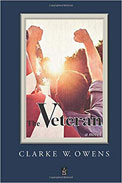
 |
This is a book that's fueled more by its character examination than its plot. That's not to say that there is no plot in the novel but that it is one more akin to those found in the literary works of novelists from the mid-twentieth century than contemporary potboilers. The story revolves around Joe Dover's life, and like all lives, it is both unique and universal. The uniqueness comes from Joe's various experiences and relationships. The universality comes in the emotional high and low roads Joe, like all of us, winds up traveling. While it is the chronicle of one individual, it is also the story of every individual. Therein lies the appeal of this thoughtful, contemplative, and engrossing tale.
The majority of the narrative takes place after Joe's separation from the army at the end of World War II. He fought in the Pacific and, unlike many of his mates, was lucky enough to avoid being killed while still keeping his body in one piece. His mind, however, is a different matter. Joe would be the last person to use the horrors of war as any motivation or excuse for his subsequent behavior of continually pursuing sexual affairs outside his marriage. In Joe's mind, at least to the degree he infrequently engages in introspection, it is simply the nature of man. An adherence to monogamy, he believes, is surely more the result of restrictive religious and societal mores than of actual human disposition.
Joe's story unfolds over many years, more than one marriage, and takes place in the western United States during what is often referred to as the conformist fifties, the tumultuous sixties, and the beginning of the me-generation seventies. While every decade—every era for that matter—has its own seminal events and gestalt, it is the ubiquitous vicissitudes of life, unencumbered by time or place, that pull readers into Joe's chronicle.
Author Owens' style is admirably restrained. While he plows psychological ground tilled earlier by such writers as John Cheever, John Updike, and Philip Roth, Owens' terse observations are no less profound. For example, this is seen when he relates Joe's opinion on the dignity (or rather the lack thereof) of death. "He saw no dignity in it. It was nothing, the embodiment of nothing, the celebration of nothing. You came in as an accident, you went out the same way."
There is an economy to Owens' storytelling that moves in lockstep with his writing style. He never provides more information than the reader actually needs. Character interaction and behavior dominate in the narrative. Meanwhile, any expository prose is kept to a minimum. Whether discussing the dissolution of a relationship or the terror of a life-threatening storm, the author's depictions are spare yet riveting. This stylistic choice heightens the feeling that Joe's life is, in reality, a reflection of all our lives.
In his play, Shadowlands, William Nicholson has his fictional characterization of the very real C. S. Lewis intone the profundity, "We read to know that we are not alone." If that is indeed the case, readers should prepare to be accompanied by a past, present, and future humanity when they read this intriguing and thought-provoking book.
A 2021 Eric Hoffer Book Award Category Finalist.
RECOMMENDED by the US Review